限定词
- 格式:doc
- 大小:89.50 KB
- 文档页数:12
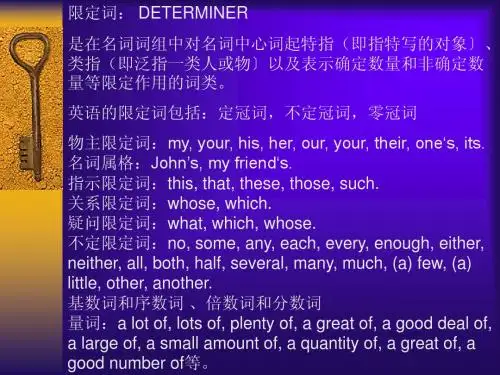
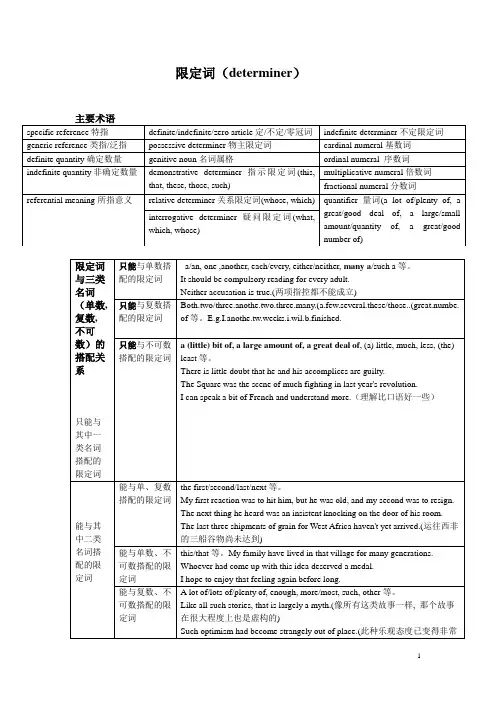
限定词(determiner)限定词的先后顺序: 前位---中位---后位(一个名词中心词之前不可并用两个前位限定词或两个中位限定词)冠词的表意功能(1)The ten of them have passed the final examination.Ten of them have passed the final examination.Ten of the (these/his) students have passed the final examination.(2)They asked to stop counting presidential votes for a second time.(3)Every boy and every girl___(have) his merits.Every young man, young lady,and child ___(be) requested to take part.Many a person___(be) going to the take the test.(4)Other or anotherCalifornia covers a large area than __________state except Alaska and Texas.Out of the three foreign guests, one is from Frankfurt, ______two are from Vienna.. Don'.los.heart.Hav.___try.There's room for _________people in the back of the bus.(5). ing.We'l.hav.____.five-da.holiday.(6)冠词的用法Who is ___captain of your team?. Mr.Reaga.wa.electe.___Presiden.o.th.Unite.State.i.1980.Charles Dickens,__author of David Copperfield, was a distinguished English novelist.As ____physician, he does not deserve much praise.He was covered with snow from ___head to __foot.The relation between ___teacher and ___student is excellent.This room serves the triple purpose of ___study, ___bedroom and ____sitting room. The old man was sitting in a chair, ___pipe in ___hand.He sat at ___ table, ___coat off, ___head down, and __pen in ___hand.What kind of ___man is he?What sort of ___book do you want?The work is ____pleasure to me.She has developed ___love for labour.Physics is ____ science.He spoke with _____ enthusiasm which inspired us all.Do you like ___ music of ___film?Phonetics is ____science of speech sounds。
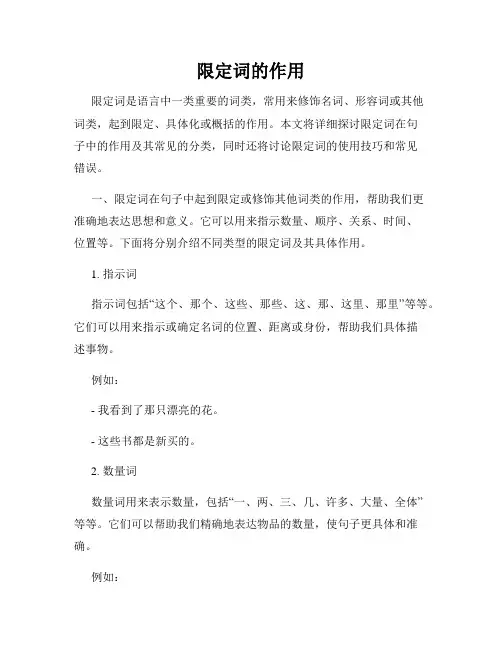
限定词的作用限定词是语言中一类重要的词类,常用来修饰名词、形容词或其他词类,起到限定、具体化或概括的作用。
本文将详细探讨限定词在句子中的作用及其常见的分类,同时还将讨论限定词的使用技巧和常见错误。
一、限定词在句子中起到限定或修饰其他词类的作用,帮助我们更准确地表达思想和意义。
它可以用来指示数量、顺序、关系、时间、位置等。
下面将分别介绍不同类型的限定词及其具体作用。
1. 指示词指示词包括“这个、那个、这些、那些、这、那、这里、那里”等等。
它们可以用来指示或确定名词的位置、距离或身份,帮助我们具体描述事物。
例如:- 我看到了那只漂亮的花。
- 这些书都是新买的。
2. 数量词数量词用来表示数量,包括“一、两、三、几、许多、大量、全体”等等。
它们可以帮助我们精确地表达物品的数量,使句子更具体和准确。
例如:- 我买了三本新书。
- 孩子们一起高声唱起了儿歌。
3. 顺序词顺序词用来表示顺序或次序,包括“第一、第二、最后、然后、接着”等等。
它们可以帮助我们按照特定的顺序或次序描述事件。
例如:- 我是第一次来这个城市。
- 他先刷牙,然后洗脸。
4. 限定冠词限定冠词有“the、a、an”三个,它们用来修饰名词,帮助我们具体化或泛指事物。
例如:- 我看到了一只小猫。
- 我喜欢去公园。
5. 物主代词物主代词包括“我的、你的、他的、她的、我们的、你们的、他们的”等等。
它们用来表示所属关系,帮助我们具体描述物品的所有者。
例如:- 这是我的钱包。
- 这是我们的家。
二、限定词的使用技巧为了正确、恰当地使用限定词,我们需要掌握一些使用技巧。
以下是一些建议:1. 根据语境选择合适的限定词。
根据句子需要的具体性或泛指性来选择适当的限定词。
2. 注意时态和单复数的一致。
限定词需要与其修饰的名词在时态和单复数上保持一致。
3. 避免过度使用限定词。
过度使用限定词可能会使句子显得拖沓或啰嗦,影响阅读体验。
三、常见错误在使用限定词时,我们需注意一些常见的错误。
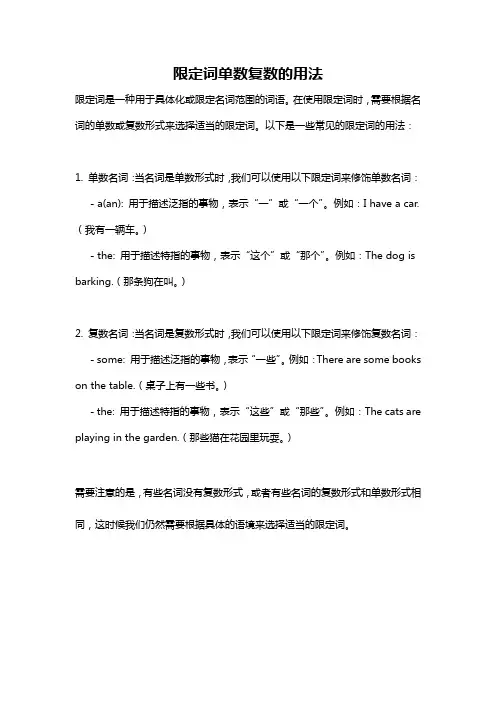
限定词单数复数的用法
限定词是一种用于具体化或限定名词范围的词语。
在使用限定词时,需要根据名词的单数或复数形式来选择适当的限定词。
以下是一些常见的限定词的用法:
1. 单数名词:当名词是单数形式时,我们可以使用以下限定词来修饰单数名词:
- a(an): 用于描述泛指的事物,表示“一”或“一个”。
例如:I have a car.(我有一辆车。
)
- the: 用于描述特指的事物,表示“这个”或“那个”。
例如:The dog is barking.(那条狗在叫。
)
2. 复数名词:当名词是复数形式时,我们可以使用以下限定词来修饰复数名词:
- some: 用于描述泛指的事物,表示“一些”。
例如:There are some books on the table.(桌子上有一些书。
)
- the: 用于描述特指的事物,表示“这些”或“那些”。
例如:The cats are playing in the garden.(那些猫在花园里玩耍。
)
需要注意的是,有些名词没有复数形式,或者有些名词的复数形式和单数形式相同,这时候我们仍然需要根据具体的语境来选择适当的限定词。
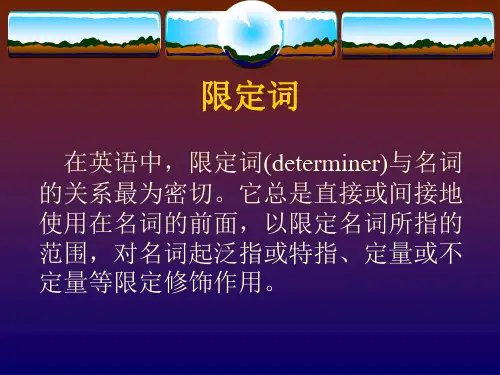
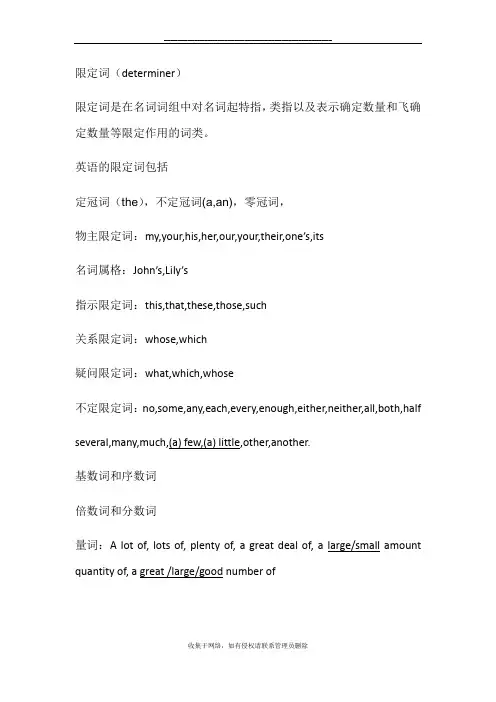
限定词(determiner)限定词是在名词词组中对名词起特指,类指以及表示确定数量和飞确定数量等限定作用的词类。
英语的限定词包括定冠词(the),不定冠词(a,an),零冠词,物主限定词:my,your,his,her,our,your,their,one’s,its名词属格:John’s,Lily’s指示限定词:this,that,these,those,such关系限定词:whose,which疑问限定词:what,which,whose不定限定词:no,some,any,each,every,enough,either,neither,all,both,half several,many,much,(a) few,(a) little,other,another.基数词和序数词倍数词和分数词量词:A lot of, lots of, plenty of, a great deal of, a large/small amount quantity of, a great /large/good number of限定词与三类名词的搭配关系。
(U,C,Plural)能与这三类名词搭配的:The,some,any,no,other,whose以及my,your等物主限定词和名词属格(John’s,my friend’s)I have no time to write to you.It is still unclear whose houses were burnt last night.只能与单数名词搭配的限定词A(an),one, another,each,every,either,neither,many a, such a,etc.He is going to buy another car.只能与复数名词搭配的限定词Both ,two,three,another two/three,many, (a)few , several,these,those,a (great) number of等只能与复数名词搭配。
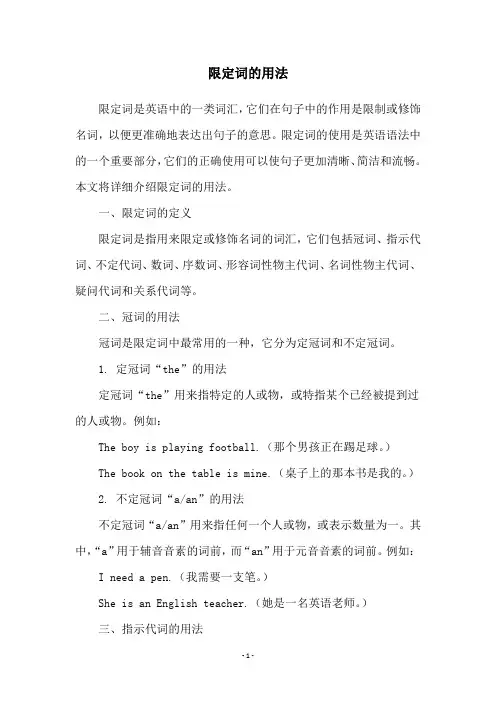
限定词的用法限定词是英语中的一类词汇,它们在句子中的作用是限制或修饰名词,以便更准确地表达出句子的意思。
限定词的使用是英语语法中的一个重要部分,它们的正确使用可以使句子更加清晰、简洁和流畅。
本文将详细介绍限定词的用法。
一、限定词的定义限定词是指用来限定或修饰名词的词汇,它们包括冠词、指示代词、不定代词、数词、序数词、形容词性物主代词、名词性物主代词、疑问代词和关系代词等。
二、冠词的用法冠词是限定词中最常用的一种,它分为定冠词和不定冠词。
1. 定冠词“the”的用法定冠词“the”用来指特定的人或物,或特指某个已经被提到过的人或物。
例如:The boy is playing football.(那个男孩正在踢足球。
)The book on the table is mine.(桌子上的那本书是我的。
) 2. 不定冠词“a/an”的用法不定冠词“a/an”用来指任何一个人或物,或表示数量为一。
其中,“a”用于辅音音素的词前,而“an”用于元音音素的词前。
例如: I need a pen.(我需要一支笔。
)She is an English teacher.(她是一名英语老师。
)三、指示代词的用法指示代词用来指示某个人或物的位置或身份,分为“this”、“that”、“these”和“those”四种。
1. “this”和“that”的用法“this”用来指示离说话人较近的人或物,而“that”用来指示离说话人较远的人或物。
例如:This is my car.(这是我的车。
)That is his book.(那是他的书。
)2. “these”和“those”的用法“these”用来指示离说话人较近的复数人或物,而“those”用来指示离说话人较远的复数人或物。
例如:These are my friends.(这些是我的朋友。
)Those are their bags.(那些是他们的包。
)四、不定代词的用法不定代词用来指代不确定的人或物,包括“some”、“any”、“no”、“none”、“every”、“each”、“either”和“neither”等。
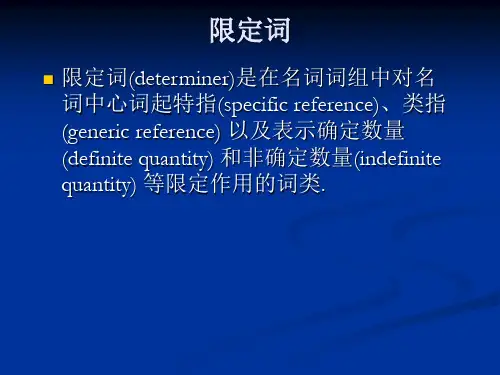
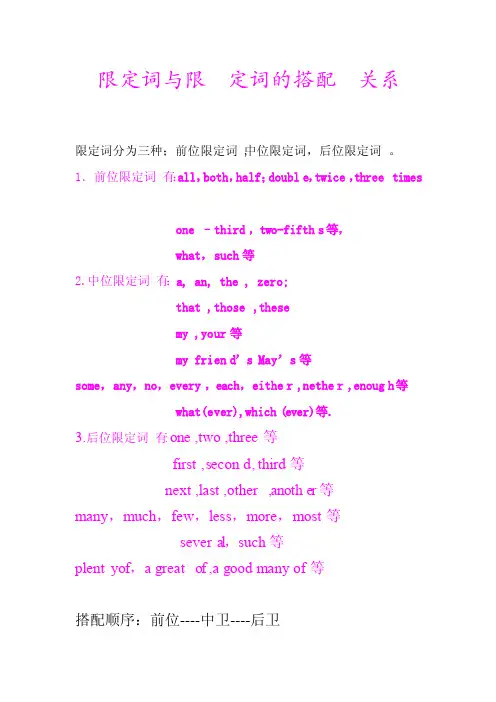
限定词与限定词的搭配关系限定词分为三种;前位限定词,中位限定词,后位限定词。
1.前位限定词有:all,both,half;double,twice,three times one –third,two-fifths等,what,such等2.中位限定词有:a, an, the , zero;that ,those ,thesemy ,your等my friend’s May’s等some,any,no,every,each,either ,nether ,enough等what(ever),which(ever)等.3.后位限定词有: one ,two ,three等first, second , third等next ,last ,other ,another等many,much,few,less,more,most等severa l,such等plenty of,a great of ,a good many of等搭配顺序:前位----中卫----后卫如:all the four teachers前--------中—后all your threebooks前—中—后如果只有两位限定词,也是这个顺序:all otherstuden ts前—后such a misfor tune前----中thoselast few years中-----后—后注意:中位限定词和前位限定词之间相互排斥,即一个词前不能有两个中位或后位限定词。
故,“我的那本书”不是my that book ,而是that book of mine。
而后位限定词却可重叠使用,如those last few months , another twenty tons, many more copies, the first two chapte rs,such 既属于前位限定词,又属于后位限定词。
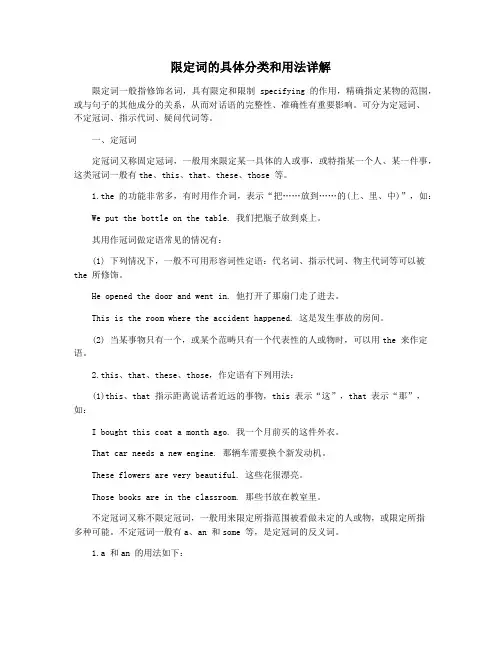
限定词的具体分类和用法详解限定词一般指修饰名词,具有限定和限制specifying 的作用,精确指定某物的范围,或与句子的其他成分的关系,从而对话语的完整性、准确性有重要影响。
可分为定冠词、不定冠词、指示代词、疑问代词等。
一、定冠词定冠词又称固定冠词,一般用来限定某一具体的人或事,或特指某一个人、某一件事,这类冠词一般有the、this、that、these、those 等。
1.the 的功能非常多,有时用作介词,表示“把……放到……的(上、里、中)”,如:We put the bottle on the table. 我们把瓶子放到桌上。
其用作冠词做定语常见的情况有:(1) 下列情况下,一般不可用形容词性定语:代名词、指示代词、物主代词等可以被the 所修饰。
He opened the door and went in. 他打开了那扇门走了进去。
This is the room where the accident happened. 这是发生事故的房间。
(2) 当某事物只有一个,或某个范畴只有一个代表性的人或物时,可以用the 来作定语。
2.this、that、these、those,作定语有下列用法:(1)this、that 指示距离说话者近远的事物,this 表示“这”,that 表示“那”,如:I bought this coat a month ago. 我一个月前买的这件外衣。
That car needs a new engine. 那辆车需要换个新发动机。
These flowers are very beautiful. 这些花很漂亮。
Those books are in the classroom. 那些书放在教室里。
不定冠词又称不限定冠词,一般用来限定所指范围被看做未定的人或物,或限定所指多种可能。
不定冠词一般有a、an 和some 等,是定冠词的反义词。
1.a 和an 的用法如下:(1)a 用于以元音音素(a、e、i、o、u) 开头的单数可数名词前,而an 则用于以辅音音素开头的单数可数名词前。
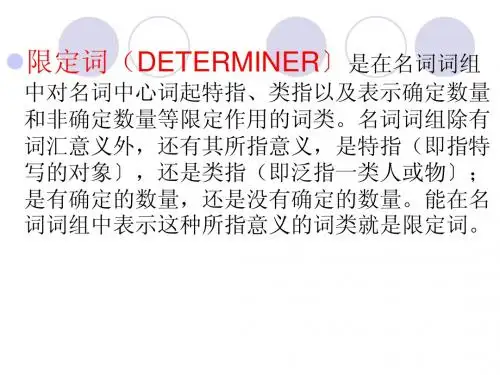
限定词(Determiners)(一)概述:限定词是对名词词组中心词起特指或泛指、定量或不定量等限定作用的一类词。
限定词包括冠词、不定代词、指示代词、名词或代词所有格、数词与某些形容词性的物主代词。
(二)限定词包括哪些:①冠词:a, an, the②形容词性物主代词:my, your, her, his, our, their, one’s, its③指示代词:this, that, these, those④不定代词:all, both, one, any, some, no, another, either, neither, and est.⑤形容词:every, each, such, next, last, other, and est.⑥副词:twice, three, times, double, and est.⑦数词:one, two, three, first, second, one-third, and est.⑧名词的S所有格:Mary’s, China’s, teacher’s, and est.⑨量词短语:a lot of, a bit of, a number of, a great deal of, plenty of, and est.例如:The building has an emergency exit on every floor.冠词的用法:(1)定冠词(the)的用法:a. 用于单数名词前,代表某一类人或物。
例如:--This is easier for the teacher than for the student.--The whale is in danger of becoming extinct.--The compass was invented in ancient China.b. 用于指世上独一无二的东西,如The sun, the moon, the earth, the sky, the universe, the outer space, the world, the globe, the atmosphere等。
限定词(determiner)限定词是在名词词组中对名词中心词起特指、泛指、定量或不定量等限定作用的一类词。
一、英语限定词种类1.定冠词,不定冠词,零冠词。
如:the, a2.名词属格。
如:my friend’s, Tom’s…3.物主限定词。
如: my, your …4.指示限定词。
如:this, that, these, those, such…5.疑问限定词。
如:what, whose, which…6.关系限定词。
如:which, whose…7.不定限定词。
如:some, any, each, every, either, neither, all8.数词(基数词、序数词、倍数词、分数词)9.量词。
如:a lot of, lots of , a great/good deal of ,a great/large/good number of …二、限定词与三类名词的搭配关系限定词按它词汇意义可分为特指限定词、泛指限定词、定量限定词、不定量限定词四大类。
这四类限定词有的能与单数、复数可数名词搭配,也可与不可数名词搭配1) 能与三类名词搭配的限定词主要有the; my, John’s, the old man’s…; some, any, no, all, other,such, what(ever), which (ever), whose…eg. the book----the books----the money,my book----my books----my moneyJohn’s book--- John’s books---- John’s money2) 能与单数名词搭配的限定词。
如:a (n) , each, every, another, either ,one, neither, many a, such a (n) …eg. each worker,every student,either book,another book3) 能与复数名词搭配的限定词。
限定词(determiner)限定词是在名词词组中对名词起特指,类指以及表示确定数量和飞确定数量等限定作用的词类。
英语的限定词包括定冠词(the),不定冠词(a,an),零冠词,物主限定词:my,your,his,her,our,your,their,one’s,its名词属格:John’s,Lily’s指示限定词:this,that,these,those,such关系限定词:whose,which疑问限定词:what,which,whose不定限定词:no,some,any,each,every,enough,either,neither,all,both,half several,many,much,(a) few,(a) little,other,another.基数词和序数词倍数词和分数词量词:A lot of, lots of, plenty of, a great deal of, a large/small amount quantity of, a great /large/good number of限定词与三类名词的搭配关系。
(U,C,Plural)能与这三类名词搭配的:The,some,any,no,other,whose以及my,your等物主限定词和名词属格(John’s,my friend’s)I have no time to write to you.It is still unclear whose houses were burnt last night.只能与单数名词搭配的限定词A(an),one, another,each,every,either,neither,many a, such a,etc.He is going to buy another car.只能与复数名词搭配的限定词Both ,two,three,another two/three,many, (a)few , several,these,those,a (great) number of等只能与复数名词搭配。
限定词限定词(DETERMINER〕是在名词词组中对名词中心词起特指(SPECIFIC REFERENCE〕、类指(GENERIC REFERENCE〕以及表示确定数量(DEFINITE QUANTITY〕和非确定数量(INDEFINITE QUANTITY〕等限定作用的词类.名词词组除有词汇意义外,还有其所指意义(REFERENTIAL MEANING〕,是特指(即指特写的对象〕,还是类指(即泛指一类人或物〕;是有确定的数量,还是没有确定的数量.能在名词词组中表示这种所指意义的词类就是限定词.英语的限定词包括:定冠词(DEFINTITE ARTICLE〕,不定冠词(INDEFINITE ARTICLE〕,零冠词(ZERO ARTICLE〕物主限定词(POSSESSIVE DETERMINER〕,my, your, his, her, our, your, their, one's, its.名词属格(GENITIVE NOUN〕,John's, my friend's.指示限定词(DEMONSTRATIVE DETERMINER〕,this, that, these, those, such.关系限定词(RELATIVE DETERRMINER〕,whose, which.疑问限定词(INTERROGATIVE DETERMINER〕,what, which, whose.不定限定词(INDEFINITE DETERMINER〕,no, some, any, each, every, enough, either, neither, all, both, half, several, many, much, (a) few, (a) little, other, another.基数词(CARDINAL NUMERAL〕和序数词(ORDINAL NUMERAL〕倍数词(MULTIPLICATIVE NUMERAL〕和分数词(FRACTIONAL NUMERAL〕量词(QUANTIFIER〕a lot of, lots of, plenty of, a great of, a good deal of, a large of, a small amount of, a quantity of, a great of, a good number of等.限定词与名词词组中心词之间有着某种固定的搭配关系;如果名词之前带有两个或两个以上的限定词,则限定词与限定词之间也有某种固定的搭配关系.本讲主要解决这两种搭配关系问题.1 限定词与三类名词的搭配关系限定词的选择决定于随后的名词的类别,是单数名词、复数名词,还是不可数名词.1〕能与三类名词搭配的限定词有些限定词如the, some, any, no, other, whose以及my, your等物主限定词和名词属格(John's, my friend's〕等能与三类名词搭配.例如:the book, my book, my friend's book, John's book, any book, some book, no book, the other book,whose book, the books,my books, my friend's book, John's books, any books, some books, no books, the other books, whose books, the money, my money, my friend's money, John's money, any money,some money, no money, the other money, whose money.2〕只能与单数名词搭配的限定词有些限定词如a(n), one, another, each, every, either, neither, many a, such a 等只能与单数名词搭配.例如:each worker, either book, an apple, another book, such a book, every student, neither sentence, one copy, many a book.3) 只能与复数名词搭配的限定词有些限定词如both, two, three, another two / three, many, (a) few, several, these, those, a (great) number of等只能与复数名词搭配.例如:both workers, several students, a number of essays, many students, (a) few words, these / those books, two / three visitors, another two / three students.4) 只能与不可数名词搭配的限定词有些限定词如a (little) bit of, a great amount of, a great deal of, (a) little, much等只能与不可数名词搭配.例如:a bit of water, a great amount of labour, a great deal of work, (a) little space, much noise.5〕能与单、复数名词搭配的限定词有些限定词如the first, the second, the last, the next等既可与单数名词搭配,也可与复数名词搭配.例如:the first rose, the last man, the next meeting, the first roses, the last men, the next meetings.6〕能与单数名词和不可数名词搭配的限定词有些限定词如this, that, (the) least等能与单数名词和不可数名词搭配.例如:(the) least sign (of prejudice), this / that job, (the) least knowledge, this / that work.7〕能与复数名词和不可数名词搭配的限定词还有些限定词如a lot of, lots of, enough, more, most, such, other等可与复数名词和不可数名词搭配.例如:a lot of books, a lot of money, lots of chickens, lots of food, plenty of chairs, plenty of water, enough copies, enough coal, more articles, more time, most people, most work, such men, such bread, other men, other bread.不定量限定词less原先只与不可数名词搭配,但在现代英语中,less既可与不可数名词也可与复数名词搭配.例如:less money, less mistakes.2 限定词与限定词的搭配关系以上讲的是限定词与三类名词的搭配关系.除上述搭配关系外,限定词与限定词之间还存在着一定的搭配关系.在名词词组中心词之前如果有两个或两个以上限定词出现时,就会产生限定词的先后顺序问题.按其不同的搭配位置,限定词可分为:1〕中位、前位、后位限定词按照限定词与限定词之间不同搭配位置,限定词可分为中位限定词(CENTRAL DETERMINER〕、前位限定词(PREDETERMINER〕和后位限定词(POSTDETERMINER〕.a) 中位限定词包括a(n), the, zero; this, that, these, those; my, your, etc; Merry's, my friend's; some, any, no, every, each, either, neither, enough; what(ever), which(ever), whose等b) 前位限定词包括all, both, half; double, twice, three times, etc; one-third, two-fifths, etc; what, such, (a / an)等c) 后位限定词包括one, two, three, etc; first, second, third, etc; next, last, other, another, etc; many, much, (a) few, (a) little, fewer, (the) fewest, less, (the) least, more, most; several, plenty of, a lot of, lots of, a great / large / good number of, a great / good deal of, a large / small amount of; such等2) 三类限定词的搭配关系如果一个名词词组带有上述三类限定词,其搭配关系总是按照"前位--中位--后位"的顺序排列.例如:all前the中four后teachers.all前your中three后books.all前these中last后few后days.如果只有上述两类限定词,其搭配关系仍按上述顺序.例如:half前his中lecture.those中last后few后months.several后hundred后guests.all前other后students.such前a中misfortune.some中such后alloy.由上述诸例可以看出,中位限定词之间和前位限定词之间是互相排拆的,即一个名词中心词之前不可并用两个中位限定词或两个前位限定词.所以,"我的那本书"不是* my that book而是that book of mine,因为my和that同是中位限定词,不可同时并列.但后位限定词的使用却不受此限.除上述those last few months, several hundred guests之外, this last two books, the first two chapters, three other girls, two more sheets, the next few weeks, many more copies, a few more samples, another twenty tons等都是后位限定词重叠使用的实例.个别限定词有跨类现象,如such既属于前位限定词,又可归入后位限定词.由于它只是在such a...和such an...这样的搭配中属于前位限定词,而在与其他限定词(some, any, no, all, few, another, other, many, one, two, etc)搭配时,such则是后位限定词,一律放在上述这些限定词的后面,如some such, any such, nosuch, few such, one such等。
限定词1.什么叫限定词限定词位于名词之前,对名词起特指、泛指或表示数量等限定作用的一类词,如:特指:the book, my book, this book 等(说话或听话人都知道指点哪一个事物。
)泛指:a book, some books, 等(泛指是指点任何一个(些)事物)数量:two books, many books, much sugar 等在句子中担任主语、宾语、补足语等的名词词组,一般都由“限定词(+形容词)+名词(+后置修饰语)”构成。
但是限定词有不同类型,名词有不同种类,限定词与名词不能随便搭配,因此哪些限定词可以与哪些名词并用就必须加以注意。
总的来说,限定词一般不与专有名词搭配,用于普通名词时要根据名词的数和类别来决定。
我们把名词划分为以下三类:单数可数名词:a book that book 等复数可数名词:these books such books 等不可数名词:some tea little water 等2、哪些是限定词兹将限定词列表如下,表中指明各个限定词与三类名词搭配的情况:限定词单数可数复数可数不可数a(n) book -- --a (little)bit of -- -- breada great amount of -- -- breada great (good) deal of -- -- breada great(good, large, small)number of -- books -- all day books breada lot of -- books breadanother book -- --any book books breadboth -- books --double the price the quantities the strengtheach book -- --either book -- --enough -- books breadevery book -- --(a) few -- books --fewer, (the) fewest -- books --the first, the second, etc prize prizes --half an hour the men the bread the last book books --(the ) least thing -- bread less -- -- bread (a) little -- -- bread lots of -- books bread many a book books -- more -- books bread most -- books bread much -- -- bread my, your, his, etc book books bread Tom’s, the old man’s, etc book books bread neither book -- --the next book books --no book books bread one book -- --one-third, two-fifths, etc (of)the book (of) the books the time other student students breadthe other book books -- plenty of -- books bread several -- books --some (某一)book books bread such book books bread that book books bread the book books bread these -- books --this book -- bread those -- books -- twice, three times, etc the figure the quantities his strength two, three, etc -- books --what(ever) book books bread which(ever) book books bread whose book books bread zero(不用冠词或其它限定词) man men bread [注] 表内“—”表示有关限定词不能与该类名词搭配。
限定词的搭配 1、概说名词词组中,当两个或两个以上的限定词同时出现时,限定词之间有一定的搭配关系,根据其不同的搭配位置可分为三类,其中最重要的一类是中位限定词,它的前面可有前位限Write your answer on every other line.Both my All these last few 干旱)。
在上面三个句子中every, my, these 是中位限定词;both 与all 是前位限定词,用在中位限定词的前面;other, last, few 是后位限定词,用在中位限定词的后面.1、限定词的搭配关系[注]:上表中的分类是指基本的情况,有的限定词可以有跨类的现象,如:what, such, many, 可有 what a, such a, many a 的搭配等。
3、中位限定词1)、冠词、指示代词、形容词性物主代词、名词所有格等互相排斥,在同一个名词词组中只能用其中的一个,例如:TheThis, That, These, ThoseMy, Your,… book(s) is/are on the table.Tom’s, The teacher’s…2) 不定冠词A(N)不定冠词a(n)可以与基数词,序数词,few, little, such, many 等后位限定词搭配,例如:It’s only a two hours’ journey by bus.This raises a second question.Tom has a few tickets.May I have a little ink?It was such a misfortune (不幸).Such an expression (表达)is never heard on British lips( 英语口语).He has been to Peiking many a time.注1.“a”与基数词搭配时,这个基数词后面一般跟随一个名词,一同作定语修饰另一个名词。
注2. “many+a” 的结构一般常为“many+复数名词”的结构所代替,例如:He has been to Beijing many times.3)定冠词the定冠词the可以与基数词,序数词,类序数词next, last, other,以及many, more, few, little 等到后位限定词搭配,例如:The two visitors had a long talk with her.This is the second time for you to try.You can find some useful material in the next/last/other book.Among the many (few)friends he has are the Chang brothers.The more drills you do today, the less mistakes you’ll make tomorrow.The little money that is left is not enough for the book.4)指示代词THIS THAT指示代词this, that 可以与基数词,序数词,类序数词next, last, other 以及few, several 等后位限定词搭配,例如:We are on duty that (this) six days.That (this) third brother of his is such a spitfire(急燥的人).I didn’t find what I want in that (this) first book of Smith’s ongrammar. Nor did I find it in that (this) next or last grammar book of his. And nor in that (this) other book of his on rhetoric(修辞).That (this) few (several)months in the countryside have been most eventful(多事的).5)指示代词THESE,THOSE指示代词these, those可以与基数词以及few等到后位限定词搭配,例如:Please send these five samples(样品) to London by air.Those three boxes have not been checked off yet.6)形容词性物主代词和名词所有格形容词性物主代词(my, your, his, her, its, our, their)和名词所有格(Tom’s, Mike’s)可以与基数词,序数词,类序数词next, last, other以及many, few, little等后位限定词搭配,也可与中位限定词搭配,例如:Their (Old Li’s) two sons are both in the army.The visitor found everything so new to him during his first weeks in China.His (John’s, The writer’s) next (other)book will come out(出版) pretty soon.Her (Mary’s, The author’s作者) last (other) book has long been out of print.His (John’s) many (few) friends often speak highly(称赞) of him.Her (John’s) little knowledge of French has helped him greatly.Their/ The enemy’s every movement is being watched.在这句中可用“all+复数可数名词” 的结构代替。